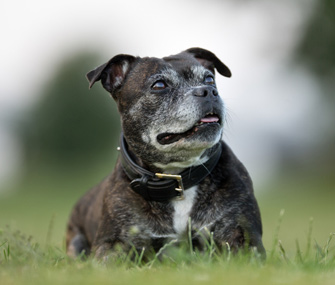We Asked, You Answered: What Advice Would You Offer Someone Adopting a Senior Dog?
Published on August 15, 2016
Skip To

True, they may have some age-related health issues (like arthritis, dental disease or failing vision or hearing) that require attention or treatment. But older dogs have lots of pros, too, like the fact that they’re likely to be better trained than a puppy and they’re probably game to lounge around with you and take it easy. And when it comes to adopting a senior dog, you have the benefit of knowing what you’re getting in terms of size and in most cases, personality.
Our readers recently shared some great tips for people getting their first dog or cat — and in fact, we know that many of you have opened your homes to adult dogs. So when we wanted to offer tips to people looking to welcome an older canine into the family, we turned to our Vetstreet Facebook followers and asked: What’s the one piece of advice you’d give someone adopting a senior dog? And, as we suspected, our readers came through with some excellent — and touching — words of wisdom.
Advice for Someone Adopting a Senior Dog
Many readers expressed the importance of showering your senior dog with love. "Love them unconditionally, as you don’t know how long you will have them," said Peggy Lowe-Brooks. "Enjoy each day they are in your life."Rich Dunn agreed, saying, "Love them, love them. [T]reat them like family, be there to the end and hope someday to see them on the other side!" Dee Davis added, "Make sure you’re committed to love, care and cater to them for them the rest of their lives."
Mike Carroll suggested remembering that, for some dogs, age might be just a number: "Have fun with them; they still have a lot of energy and the desire to do most anything they ever did before. Baby them big time and be ready to be on the receiving end of some serious love and affection from them. Just let them enjoy the rest of their life like never before."
William West Patience’s experience backs up Carroll’s suggestion. "I have had dogs that lived until 15, then I adopted one that was 16 because no one else would," he said. "It has been a rewarding experience and has taught me so much. Except for some mobility issues he doesn’t know he’s an old dog."
Of course, it’s important to remember that taking on a dog during his golden years can be a big responsibility, and potential owners should be ready for that. "…[R]emember they may have expensive medical bill[s]; be prepared to give them the medical care they will need," said Priscilla Leuliette.
Susan Holt Stanley was of a similar mind, saying, "Love them with your heart, care for them medically and tell them a million times how special they are!"
And Sarah Vaughn reminded us of the golden rule: "Be patient! One day you’re going to be elderly and you don’t want someone yelling at or getting frustrated with you because you move so slowly and have accidents because you can’t make it outside (or to the facilities) in time."
If you’re considering bringing a senior dog into your home, there are numerous things you can do to help him enjoy his senior years. You might take steps to pet-proof your home in a way that makes it easier for him to get around. And believe it or not, teaching your old dog new tricks isn’t only possible, it’s a great way to help your new-old pup stay mentally and physically sharp! Getting him to the vet for regular exams and keeping an eye out for any physical or behavioral changes is important for dogs of all ages, but becomes perhaps even more important as he ages.
More on Vetstreet:





